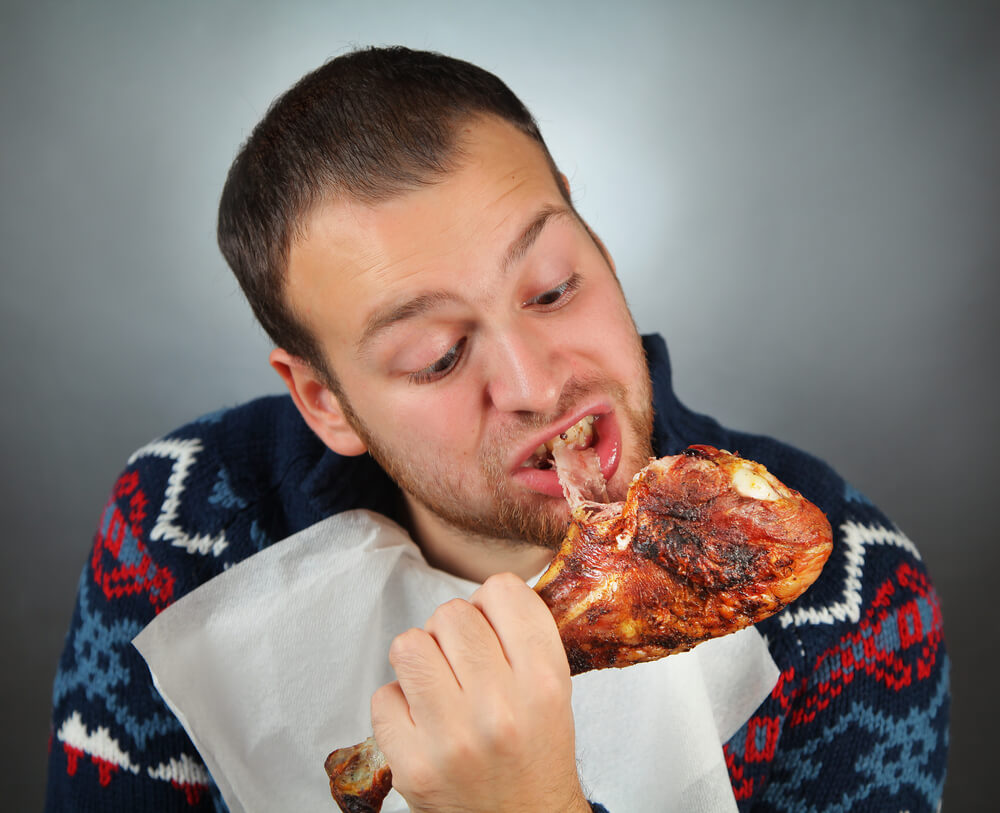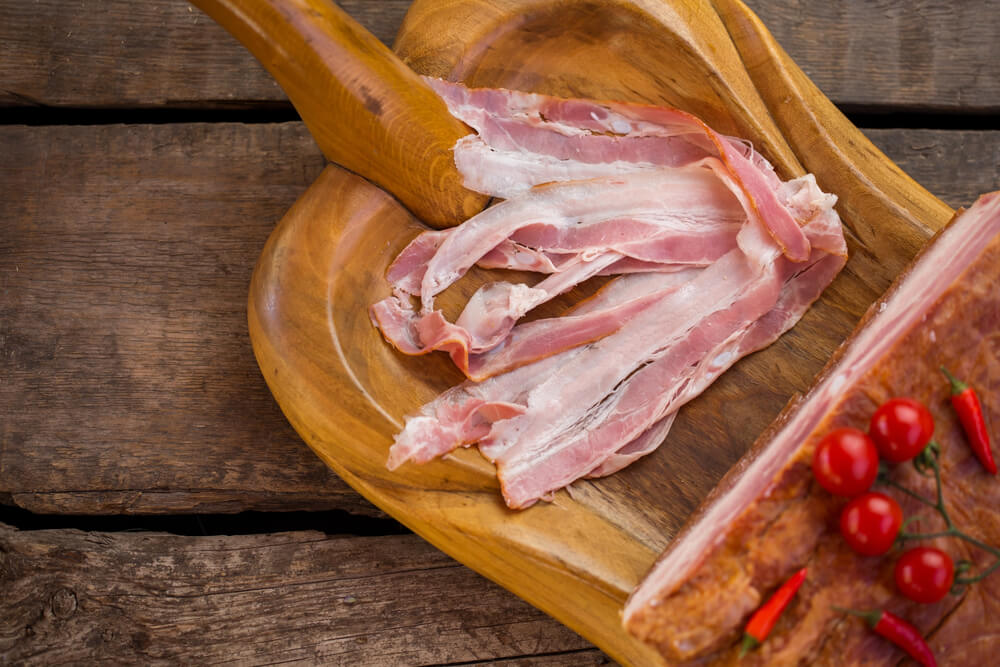
Not all fats are created equal. Some are good. Some are bad. Do you know which ones fall into the good or bad groupings? We do and we’re telling how to Eat Fat To Get Thin & Fit! Read on to find out more.
It’s true: Not all fat is bad. With that said, dietary fats used to be considered far worse than carbs. They were generally thought to be the reason behind heart disease and other health problems. These macronutrients have finally started to get a better rep thanks largely to the fitness and nutrition world. But for some reason, it is still not clear to many that dietary fats are good for us.
The government still shows food in pyramids where dietary fats are listed as stuff that you really should limit your consumption of. Even some nutritionists will tell people that all dietary fats are bad.
When will the population – especially men – be told the truth about fats?
What’s the truth?
Dietary fats are essential for human life. Men need to consume them at higher amounts to regulate muscle growth and hormone production. Let’s take a look at dietary fats and what they mean for men.

What Are Dietary Fats?
They call them dietary fats mainly to point out that they are the types of fats that should be a part of your diet program.
The main three categories of fats you need are:
- Monounsaturated fats
- Polyunsaturated fats
- Saturated fats
The full term is technically fatty acids, but we never really use the end part unless discussing omega fatty acids.
There is one fat you should stay completely away from. Which one? It’s trans-fat. This fat is now being banned in the United States. It was already banned in a number of other countries such as Great Britain.
Fats are very important for your diet. You may have seen the following terms or heard some discussion about these fats. To refresh your memory, let’s look at some example foods.
- Monounsaturated fat – This includes avocado, almond, hazelnut and even peanut butter. A lot of nuts, including peanut oil, contain this fat.
- Polyunsaturated fats – This includes margarine, canola oil, flaxseed oil and most other cooking oils. Then you also have all the omega fatty acids (from 3-9).
- Saturated fats – This includes red meat, whole milk, cheese, egg yolk, coconut oil, dark chocolate, pork and many others.
There are of course hundreds of other fatty foods out there that fit into one of these categories. But with this list, you at least get a good idea of what to look out for.
Why Are Dietary Fats Good For You?
The main points you should really know about fat are that our bodies use them for energy storage and energy production. These two factors should already sound pleasing, but there are actually more benefits to come.
Fats have always been the source of energy for human beings dating as far back as our ancestor’s days when they didn’t have many carbs to eat. Then we also have fat storage of energy within adipose cells. This is actually a good thing if you eat right and not store the fat for long durations (you use them up fast).
With that clarified, let’s take a look at the other benefits that will make your body happy you consumed your fats for the day. Some of the top reasons are:
- High fat diet leads to higher levels of free testosterone.
- Fat-soluble vitamins A, D, E and K can be transported throughout the body via the bloodstream.
- Fats that are consumed can help with tissues such as skin.
- Dietary fats also protect your nerves and brain, helping them function properly. Want proof? A nerve cell is covered in myelin. This is made of fat that helps send signals between the brain and body.
- Essential fatty acids must be consumed through food or supplements. Why? The reason is because your body can’t produce them on its own. That is why they are called essential fatty acids. It is essential for you to consume them!
- Fats are used for energy once carb storages have been depleted. Without fat intake, your body will use muscle mass instead of fats for energy during training if you have used up all the carbs.

Fats Improve Testosterone Levels For Men
The first and last benefits listed in the prior bullet points are pretty crucial for you to know about as it relates to fitness and training.
Why?
Simple. They will affect your workout. Men have the hormone testosterone as their main hormone. It impacts on many factors like bone strength, muscle mass, energy and just living in general.
Women need testosterone just like men need estrogen, but the amounts are quite different. Men with low testosterone levels lack energy for daily activities such as work or even walking down the street. Your body will be simply weak if you suffer from low testosterone levels.
In order to bring your energy levels up and improve such things as your libido, you need to consider consuming a higher amount of dietary fats for the best testosterone booster. Many men were fooled into thinking fats such as saturated ones were completely bad for your heart. This never made any sense. After all, bodybuilders always ate a lot of red meat and were just fine.
Lo and behold saturated fats consumed in proper amounts are now thought to decrease the chances of heart disease. Plus, one study found that a combo of eating plenty of saturated and monounsaturated fatty acids means higher test levels.
Some experts even say the recommended daily calories you consume should come from around 35% dietary fats, followed by a higher amount of protein and then some carbs. With that said, polyunsaturated fatty acids actually did appear to be the cause of low free testosterone. That is not to say you must avoid these foods. It is just that you should not consume a large amount of them because your testosterone strength and muscle gains will go poof.

Fats Provide The Most Energy For Exercise
You definitely have to exercise and train hard if you want muscles, and having high amounts of fat seems to calm people down as well. Fat has been discussed to be a primary energy source. Each gram of fat contains 9 calories.
Sprinting and weightlifting do not get as much energy support through fats because they are not opening up the aerobic pathway. If you want to open that up, you need to think about doing some long distance running. However, this is not to confuse you because fats are needed for tapping into your stored carbs. Essentially, your entire workout becomes pretty well established when you consume enough fat.
Fats are not like protein. They have a higher calorie count per gram. Protein is okay to consume prior to training, but fats actually don’t act in the same way and may not be needed for your program.
Too Much Fat Is Bad For You
As with most anything in life, too much of something is just not good for your body. First, with fat, you will store too many of the extra calories making them very hard to use. And, too many dietary fats can still lead to heart disease.
You will most likely have to worry about consuming enough protein and veggies so your body gets a well-rounded diet.
Why?
Many people take this kind of info of how good fat is too seriously (though you must not forget there is a chance for more than just heart disease). Basically, when people hear about how good a nutrient is, all of a sudden they want to consume it in higher amounts and lower their consumption of the rest of the vital stuff.
Don’t!
High-fat diets are worthless. Low-fat diets are not going to get you anywhere, either. Simply eat the proper foods at or near the ideal amounts and help yourself with keeping your fat gains at bay. If not, and you choose to make the mistake of upping your fats and dropping the other vital stuff, then you run the risk of gaining weight over time. And, you might run the risk of other health issues.

Low Fat Consumption Could Delay Muscle Recovery
When you train at higher intensities than normal, your muscles become microscopically torn. These small tears will become inflamed and cause you to feel sore. This will most likely be even worse the next day. This is called delayed onset muscle soreness (DOMS).
DOMS is not preventable, but you can reduce the effects by improving your muscle repair process. Fats come into this discussion because dietary fats actually help regulate the inflammation that could be caused.
With low-fat storages, your body remains inflamed and doesn’t know what to do when it is time to train. Basically, you will experience DOMS much longer without a good amount of fat being consumed to reduce muscle soreness. Omega-3 fatty acids are the main ones you can benefit from in terms of inflammation reduction.
Consuming Dietary Fats Pre-Workout
Dietary fats, as mentioned, play a significant role in muscle building and training in general. The purpose of consuming fats at least an hour prior to training is to prevent them from messing with your post workout foods.
Dietary fats slow down digestion. They can also hinder proper absorption of nutrients that have been consumed post workout. However, you want these fats to be consumed before training because they simply keep your body fueled alongside carbs. This is kind of a good thing because the cells are transporting carbs to muscles for energy.
For this reason, you should definitely not consume dietary fats post workout or even during your workout. Water even becomes an issue during digestion.
Why?
Your metabolism will have been shut off once that process is underway.
A good item to consume prior to training would be peanut butter because it contains both fats and protein in high amounts. The carbs in peanut butter make it an all-around great food to consume.
Aside from peanut butter, you could even get energy from consuming nutrients like a whole egg before training. Either option is good to eat before an intense training program. Basically, you want to get all the macronutrients in your meals to get your body where you want it to be.
Conclusion
Don’t be one of those guys who makes the mistake of going on a low-fat diet or some other crazy diet. Recent studies show that the right types of fats in the proper amounts essentially protect us against heart-related disease, and can even reduce inflammation to speed up recovery.
Saturated fats are pretty safe to consume. You have to be careful though because a diet high in saturated fats could result in increased LDL consumption, which is the bad kind of cholesterol.
Essentially, if you want to be healthy, you want your diet to contain everything. Do not cut any of the macronutrients out of your life unless a doctor has told you to do so. Low carb diets almost always fall alongside low-calorie diets. Don’t bother with them. Why? Those kinds of diets are useless and cause fat gains to come back later.
Eat a healthy amount of proper dietary fats and stop yourself from thinking that they are all that bad for you. Instead of sitting around, train hard so that you are able to make use of the fats. Don’t forget: Adipose cells that fill up take much longer to burn energy or carbs. Consume a healthy diet and train hard, then watch your muscles grow!
By Brian Pankau, CPT
Latest posts by Terry M (see all)
- Garage Gyms - Aug 1, 2018
- Kettlebells – Why They Should Be Added To Your Routine. - Jul 24, 2018
- Weight Belts: What Are They Really For? - May 31, 2018










